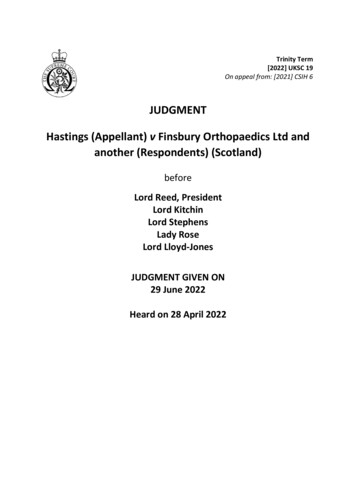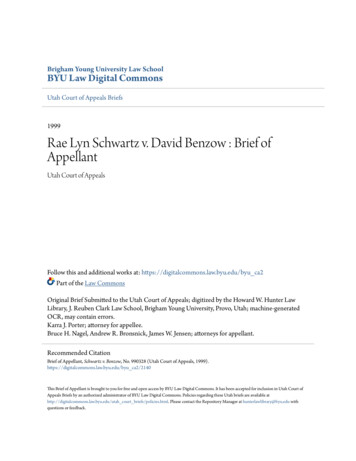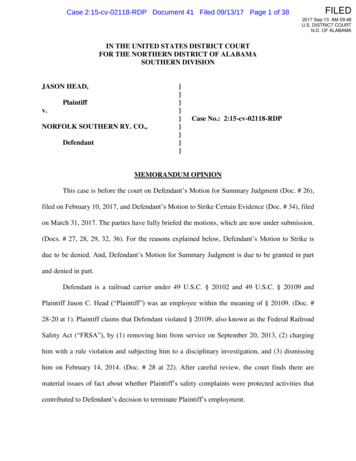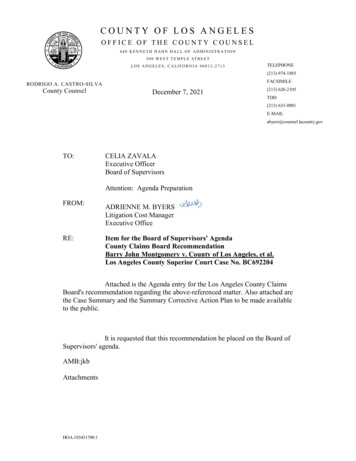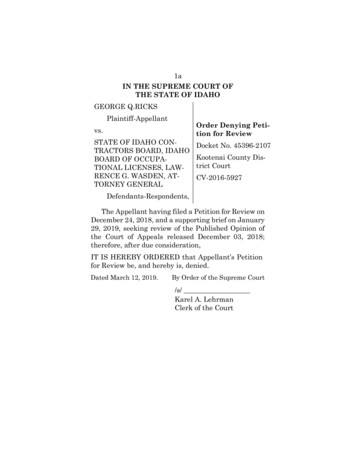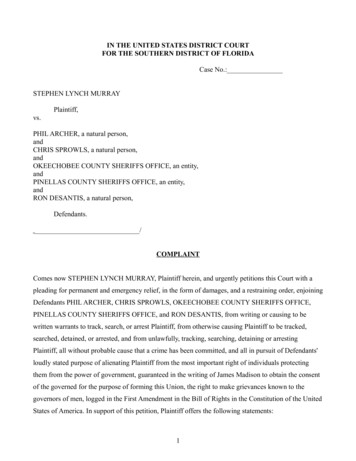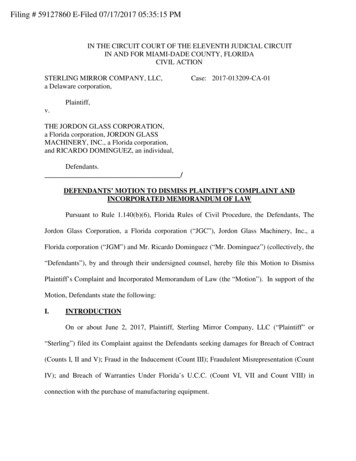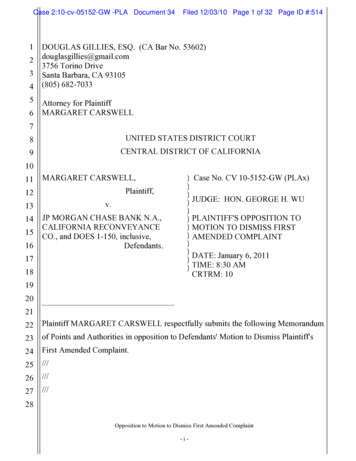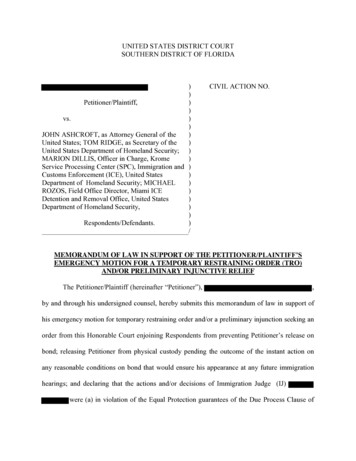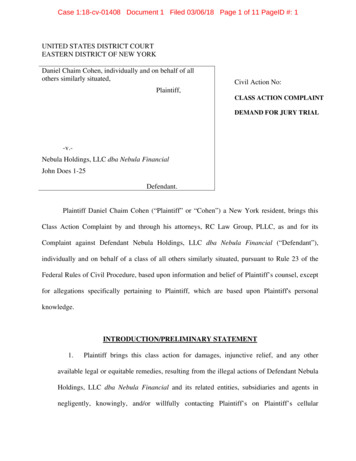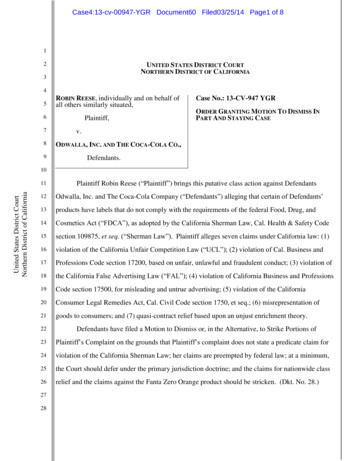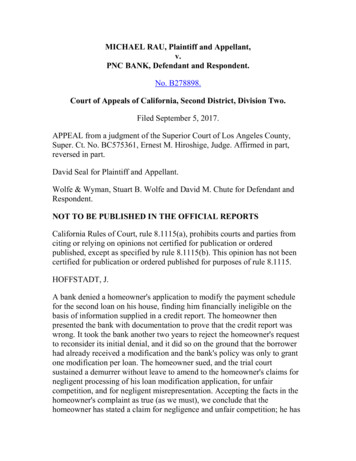
Transcription
MICHAEL RAU, Plaintiff and Appellant,v.PNC BANK, Defendant and Respondent.No. B278898.Court of Appeals of California, Second District, Division Two.Filed September 5, 2017.APPEAL from a judgment of the Superior Court of Los Angeles County,Super. Ct. No. BC575361, Ernest M. Hiroshige, Judge. Affirmed in part,reversed in part.David Seal for Plaintiff and Appellant.Wolfe & Wyman, Stuart B. Wolfe and David M. Chute for Defendant andRespondent.NOT TO BE PUBLISHED IN THE OFFICIAL REPORTSCalifornia Rules of Court, rule 8.1115(a), prohibits courts and parties fromciting or relying on opinions not certified for publication or orderedpublished, except as specified by rule 8.1115(b). This opinion has not beencertified for publication or ordered published for purposes of rule 8.1115.HOFFSTADT, J.A bank denied a homeowner's application to modify the payment schedulefor the second loan on his house, finding him financially ineligible on thebasis of information supplied in a credit report. The homeowner thenpresented the bank with documentation to prove that the credit report waswrong. It took the bank another two years to reject the homeowner's requestto reconsider its initial denial, and it did so on the ground that the borrowerhad already received a modification and the bank's policy was only to grantone modification per loan. The homeowner sued, and the trial courtsustained a demurrer without leave to amend to the homeowner's claims fornegligent processing of his loan modification application, for unfaircompetition, and for negligent misrepresentation. Accepting the facts in thehomeowner's complaint as true (as we must), we conclude that thehomeowner has stated a claim for negligence and unfair competition; he has
not stated a claim for negligent misrepresentation and may not amend hiscomplaint to allege additional claims. Accordingly, we reverse in part andaffirm in part.FACTS AND PROCEDURAL BACKGROUNDI. FactsIn 1995, Michael Rau (plaintiff) bought a home on Brenford Street inWoodland Hills (the property). The purchase was financed in part by a loanfor which the lender took out a first deed of trust.In January 2007, plaintiff borrowed 293,000 from National City Bank, andthe loan was secured by a second deed of trust on the property. Afterplaintiff experienced financial difficulties in the wake of the "GreatRecession," National City Bank in July 2009 temporarily modified the loanby (1) cutting his monthly payments in half (from 901 to 459) for twoyears, and (2) allowing him to reapply for a modification in June 2011.In October 2008, defendant PNC Bank (PNC) purchased plaintiff's loanfrom National City Bank.[1] PNC honored the temporary loan modificationgranted by National City Bank until it expired in June 2011.In June 2011, PNC invited plaintiff to reapply for a loan modification andpromised to grant one if, among other things, "his income showed he couldpay a reasonable payment to avoid foreclosure." In doing its due diligence,PNC obtained a credit report from Experian indicating that plaintiff owed 1,377 per month to pay the mortgage on a rental property in Arizona (theArizona rental property). On this basis, PNC in September 2011, deniedplaintiff's application for a loan modification on the ground that his debt-toincome ratio did not meet the minimum guidelines for a modification.Plaintiff protested that the Experian report was inaccurate because he hadlost the Arizona rental property to foreclosure and no longer paid the 1,377monthly payment. Plaintiff supplied documentary proof in the form of"public records" to support his claim. Plaintiff pressed PNC to reconsider,even going so far as hiring "a professional third party to assist" him.In April 2014, PNC sent plaintiff a letter indicating that it would notreconsider its denial of his June 2011 application due to its "onemodification per loan" rule.
To this day, PNC has not initiated foreclosure proceedings on the property.II. Procedural BackgroundIn March 2015, plaintiff sued PNC.[2]PNC demurred, but plaintiff filed a first amended complaint before thedemurrer was heard.PNC demurred to the first amended complaint, and the trial court sustainedthe demurrer with leave to amend.In the operative second amended complaint, plaintiff alleges five claimsagainst PNC: (1) constructive fraud, (2) promissory estoppel, (3) negligence,(4) negligent misrepresentation, and (5) violations of the unfair competitionlaw (Bus. & Prof. Code, § 17200 et seq.). Specifically, plaintiff alleges thatPNC was negligent because it: (1) "denied" him a loan modification "basedupon false data" found in the Experian report and "wrong math" incalculating his debt-to-income ratio using that data; (2) "denied" him a loanmodification on the basis of a bogus reason that it would only grant onemodification per loan; (3) did not "deny" his modification "in a timelymanner" (and instead took more than two years to reject his reconsiderationrequest); (4) did not accurately apprise him of the status of hisreconsideration request and instead made inconsistent representations thathis loan had been "charged off" (i.e., treated as a loss) and that he wouldreceive a modification; and (5) was obligated to grant a modification afterentertaining his reconsideration request. Plaintiff's unfair competition lawclaim rests in part upon PNC's negligence in denying the loan modification.Plaintiff alleges that unnamed PNC employees "assured and promised" himthat PNC would review the public records he offered to contradict theExperian report.PNC demurred to this complaint. As pertinent to this appeal, PNC arguedthat plaintiff did not state a claim (1) for negligence or under the unfaircompetition law because PNC owed him no duty, and (2) for negligentmisrepresentation because plaintiff did not plead the claim with sufficientparticularity.The trial court sustained the demurrer to all five of plaintiff's claims withoutleave to amend.
After the trial court entered judgment dismissing plaintiff's lawsuit, plaintifffiled this timely appeal.DISCUSSIONPlaintiff argues that the trial court erred in sustaining the demurrer withoutleave to amend as to his claims for negligence, for violations of the unfaircompetition law, and for negligent misrepresentation; he does not challengethe dismissal of his claims for constructive fraud or promissory estoppel.In reviewing a trial court's order sustaining a demurrer without leave toamend, we ask (1) whether the demurrer was properly sustained, and (2)whether leave to amend was properly denied. (Schep v. Capital One, N.A.(2017) 12 Cal.App.5th 1331, 1335 (Schep).) The first question requires us to" " determine whether the complaint states facts sufficient to constitute acause of action.'"'" (Centinela Freeman Emergency Medical Associates v.Health Net of California, Inc. (2016) 1 Cal.5th 994, 1010.) In so doing, weaccept as true "all material facts properly pled" in the operative complaint(Winn v. Pioneer Medical Group, Inc. (2016) 63 Cal.4th 148, 152), andindependently " examine the complaint . . . to determine whether it allegesfacts sufficient to state a cause of action'" (Lee v. Hanley (2015) 61 Cal.4th1225, 1230). The second question " requires us to decide whether " "there isa reasonable possibility that the defect [in the operative complaint] can becured by amendment. [Citation.]"'"'" (Schep, at p. 1335.)I. Demurrer Properly Sustained?A. Negligence (and Unfair Competition Law)To state a claim for negligence, a plaintiff must allege (1) the defendantowes him a duty, (2) the defendant has breached that duty, and (3) thebreach caused plaintiff injury. (Oasis West Realty, LLC v. Goldman(2011) 51 Cal.4th 811, 820-821.) The first duty element is "a question of lawto be determined on a case-by-case basis" and looks to " the specificaction[s] the plaintiff claims the [defendant] had a duty to undertake in theparticular case.'" (Lueras v. BAC Home Loans Servicing, LP (2013) 221Cal.App.4th 49, 62 (Lueras).)"[A]s a general rule, a financial institution owes no duty of care to aborrower when the institution's involvement in the loan transactiondoes not exceed the scope of its conventional role as a mere lender of
money." (Nymark v. Heart Fed. Savings & Loan Assn. (1991) 231Cal.App.3d 1089, 1096.) That is because, in that role, "[l]enders andborrowers operate at arm's length." (Lueras, supra, 221 Cal.App.4th at p.63.) Thus, lenders have no duty to issue a loan in the first place. Becausea loan modification is nothing more than a renegotiation of a loan'sterms, lenders also have no "duty of care to offer, consider, or approvea loan modification, or to explore and offer foreclosure alternatives."(Lueras, at p. 67; Alvarez v. BAC Home Loans Servicing, L.P. (2014) 228Cal.App.4th 941, 946 (Alvarez).)However, once a lender agrees to consider a loan modification, thelender "owe[s] . . . a duty to exercise reasonable care in the review of [aborrower's] loan modification application[]." (Alvarez, supra, 228Cal.App.4th at p. 944; Daniels v. Select Portfolio Servicing, Inc. (2016) 246Cal.App.4th 1150, 1183 (Daniels); Jolley v. Chase Home Finance, LLC(2013) 213 Cal.App.4th 872, 904-906; cf. Lueras, supra, 221 Cal.App.4th atp. 69 [noting possible claim for negligent misrepresentation if lenderprovides "inaccurate or untimely communication[s] . . . about the statusof a loan modification application"].) This duty to exercise reasonablecare when reviewing a loan modification application encompasses aduty (1) not to lose documents (Alvarez, at p. 951; Daniels, at p. 1184);(2) not to mislead the borrower by entertaining a loan modificationapplication while simultaneously pursuing foreclosure proceedings (socalled "dual tracking") (Alvarez, at p.951); (3) to process a loanmodification application in a timely manner (ibid.; Daniels, at p. 1184);(4) to "fairly evaluate [a] loan modification application (Daniels, at p.1184); and (5) to properly account for all of the borrower's loanpayments (ibid.).Under this precedent, some—but not all—of PNC's alleged conductbreaches in one or more ways the legally cognizable duty of care a lenderowes a borrower.Plaintiff's allegation that PNC relied on "false data" boils down to anassertion that it did not "fairly evaluate" his reconsideration request becauseit did not exercise due care in weighing the Experian report against thepublic records plaintiff provided. When faced with conflictinginformation, a lender is to " use good business judgment in reconcilingthe inconsistency.'" (Farasat v. Wells Fargo Bank, N.A. (D.Md. 2012) 913F.Supp.2d 197, 204, fn. 15; accord, Kirk Corp. v. First American Title Co.
(1990) 220 Cal.App.3d 785, 807 [ESCROW COMPANY HAS DUTY TOTAKE "CORRECTIVE STEPS" WHEN FACED WITH"CONFLICT[ING]" INSTRUCTIONS].) PNC may well have exercisedgood business judgment in crediting Experian's report over plaintiff'sproffered counter-evidence or in concluding that the foreclosure of theArizona rental made plaintiff an even greater risk, but all we have before usis plaintiff's allegation that PNC disregarded more accurate public records,and we must accept that allegation as true. Plaintiff's allegation that PNCacted unreasonably in taking more than two years to reject his request forreconsideration based on the public records he submitted also states a claim.(See Alvarez, supra, 228 Cal.App.4th at p. 951; Daniels, supra, 246Cal.App.4th at p. 1184.)Plaintiff's remaining allegations do not state a viable claim for negligence.Plaintiff alleges that PNC acted unreasonably in adopting a "onemodification per loan" policy, but A LENDER HAS NO DUTY TOOFFER A LOAN MODIFICATION AT ALL (Lueras, supra, 221Cal.App.4th at p. 67), so adopting a "one and done" policy violates nocognizable duty. Plaintiff makes several allegations that PNC did notaccurately apprise him of the status of his reconsideration request—bytelling him his loan had been "charged off," telling him he would receive amodification, and ultimately rejecting his request on a newly minted "onemodification per loan" policy—but these claims are based on misstatementsof PNC employees, and thus sound in negligent misrepresentation, notnegligence. (Lueras, at pp. 68-69.) Plaintiff's negligent misrepresentationallegations are defective for the reasons explained below. Moreover, at leastone of the representations plaintiff alleges PNC made is inconsistent withplaintiff's allegations elsewhere in his complaint that PNC expresslyconditioned its willingness to modify his loan upon plaintiff's financialeligibility, and "inconsistent . . . allegation[s are] properly ignored" (Ivanoffv. Bank of America, N.A. (2017) 9 Cal.App.5th 719, 733). Plaintiff lastlyalleges that PNC was obligated to modify his loan because it entertainedan application to do so. We are aware of no authority accepting such anabsolute, "in for a penny, in for a pound" mandate. What is more, wedecline to create one given that it would create a powerful disincentivefor lenders to entertain loan modifications in the first place.PNC raises three objections in response. First, PNC cites Aspiras v. WellsFargo Bank, N.A. (2013) 219 Cal.App.4th 948 for the proposition thatlenders owe borrowers no duty of care whatsoever when considering loan
modification applications. But Aspiras was depublished in 2014. (Aspiras v.Wells Fargo Bank, N.A., review den. and opn. ordered nonpub. Jan. 15,2014, S214297.) Second, PNC contends that, even if a duty of care exists,Lueras sets its outer boundary. But Lueras spoke to whether a lender owed aduty to offer, consider, or approve a loan modification in the first place(Lueras, supra, 221 Cal.App.4th at pp. 63-64, 67), not what duty of care itowes once it voluntarily agrees to entertain one. PNC does not acknowledge(or, for that matter, even cite) Alvarez, Daniels, and the other casesrecognizing a duty of care once a lender entertains a loan modificationrequest, and thus makes no effort to analyze plaintiff's claims under thisprecedent. Lastly, PNC argues (for the first time at oral argument) thatplaintiff suffered no damage because his loan modification application wasdenied without any foreclosure, and thus denied without causing him anyinjury. This argument ignores plaintiff's allegations that he incurred the costof hiring "a professional third party to assist" him.We accordingly conclude that plaintiff's operative complaint states a claimfor negligence, albeit only on the grounds of (1) PNC's alleged failure toconsider and reconcile the conflicting information regarding plaintiff's debtto-income ratio, and (2) PNC's unexplained and unreasonable delay inrejecting plaintiff's request for reconsideration. For the same reasons, andbecause a business practice is deemed "unlawful" or "unfair" if, respectively,it is forbidden by common law doctrines such a negligence or involves"unfair" conduct causing more harm than good (Aryeh v. Canon BusinessSolutions, Inc. (2013) 55 Cal.4th 1185, 1196; Prakashpalan v. Engtrom,Lipscomb & Lack (2014) 223 Cal.App.4th 1105, 1133-1134), plaintiff'soperative complaint also states a claim for violations of the "unlawful" and"unfair" prongs of the unfair competition law.B. Negligent MisrepresentationTo state a claim for negligent misrepresentation, a plaintiff must allegethat (1) the defendant misrepresented a past or existing material fact,(2) the defendant did so without a reasonable ground for believing thefact to be true, (3) the defendant acted with the intent to induceplaintiff's reliance on the misrepresented fact, (4) the plaintiff wasignorant of the truth and justifiably relied on the misrepresentation;and (5) the plaintiff suffered damage as a result. (Goonewardene v. ADP,LLC (2017) 5 Cal.App.5th 154, 175, review granted Feb. 15, 2017,S238941.) A CLAIM FOR NEGLIGENT MISREPRESENTATION
MUST BE "PLED WITH THE SAME SPECIFICITY REQUIRED INA[N] . . . ACTION FOR FRAUD." (Small v. Fritz Companies, Inc. (2003)30 Cal.4th 167, 184.) Where, as here, fraud or negligentmisrepresentation is alleged against a corporation or other collectiveentity, the plaintiff is obligated to "allege the names of the persons whomade the alleged [misrepresentations], their authority to speak, towhom they spoke, what they said or wrote, and when it was said orwritten." (Tarmann v. State Farm Mut. Auto. Ins. Co. (1991) 2 Cal.App.4th153, 157.)Plaintiff's operative complaint does not satisfy this particularly requirement.Plaintiff alleges only that "certain" PNC "employees" made variousmisrepresentations, but says nothing about their names, whether they had theauthority to speak for PNC, or when they made these allegedmisrepresentations. This claim was properly dismissed.II. Leave to Amend Properly Denied?Plaintiff argues he should be granted further leave to amend and file a thirdamended complaint. He offers four reasons why there is, in his view, a" " "reasonable possibility that the defect[s] [in the operative complaint] canbe cured by amendment."'"'" (Schep, supra, 12 Cal.App.5th at p. 1335.)First, plaintiff asserts that he has retained a new attorney who should begiven a chance to try his hand at pleading plaintiff's case. We reject thisassertion. Not only does the retention of a new attorney say nothingabout whether the defects previously identified in the complaint can becured, but adopting plaintiff's proposed assertion would effectivelycreate a "get out of dismissal free card" whenever a litigant retains newcounsel. We decline to forge such an instrument for mischief and abuse.Second, plaintiff contends that he is entitled to a further chance to amendbecause the law of foreclosure is "rapidly evolving." We reject thiscontention as well. Not only is the foreclosure law plaintiff cites a few yearsold, but the malleability of the law as a general matter says nothingabout whether the specific defects in plaintiff's complaint can be cured.Third, plaintiff posits that he can cure the defect in his negligentmisrepresentation claim by adding more specificity regarding his manyconversations with unnamed PNC employees. We disagree. Plaintiff hasnot cured the lack of specificity in his negligent misrepresentation claim
in three iterations of his complaint, even after the deficiency was calledto his attention. Because plaintiff offers no more than vague assurances ofmore specificity in his appellate briefs, we conclude that it is not reasonablypossible that giving plaintiff a fourth bite at the apple will cure a defect hehas been unwilling or unable to fix three times before.Lastly, plaintiff argues that he can state a valid claim for wrongfulforeclosure. He is wrong. As its name suggests, the tort of wrongfulforeclosure is premised on a foreclosure (Miles v. Deutsche Bank NationalTrust Co. (2015) 236 Cal.App.4th 394, 408), and PNC has not affectedany foreclosure.DISPOSITIONWe affirm the judgment dismissing plaintiff's claims for constructive fraud,promissory estoppel, and negligent misrepresentation. We reverse thejudgment dismissing plaintiff's claims for negligence and under the unfaircompetition law, but only to the extent they rest upon (1) PNC's allegedfailure to consider and reconcile the conflicting information regardingplaintiff's debt-to-income ratio, and (2) PNC's unexplained and unreasonabledelay in rejecting plaintiff's request for reconsideration. We affirm the denialof further leave to amend. We remand for further proceedings on the validlystated claims. The parties are to bear their own costs on appeal.CHAVEZ, Acting P. J. and GOODMAN, J.[*], concurs.[1] It is unclear whether this date is correct because plaintiff, as noted above, elsewherealleges that National City—not PNC—temporarily modified his loan in July 2009, ninemonths after PNC is alleged to have acquired National City. This discrepancy is notmaterial to our analysis of the issues in this appeal.[2] Plaintiff evidently filed a prior lawsuit against PNC in October 2013. The trial courtsustained the first amended complaint in that case with leave to amend. Plaintiff filed asecond amended complaint, but voluntarily dismissed it. The pleadings in the other caseare not part of the record in this appeal.[*] Retired judge of the Los Angeles Superior Court, assigned by the Chief Justicepursuant to article VI, section 6 of the California Constitution.
In October 2008, defendant PNC Bank (PNC) purchased plaintiff's loan from National City Bank.[1] PNC honored the temporary loan modification granted by National City Bank until it expired in June 2011. In June 2011, PNC invited plaintiff to reapply for a loan modification and promised to grant one if, among other things, "his income showed he could
